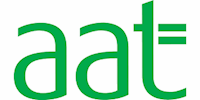AAT Level 2 Certificate in Bookkeeping
Lessons covering the whole syllabus, tutor support 7 days a week up to midnight plus printed materials
McArthur Online Training
Summary
Interest free, 2 monthly instalments of £150 or 4 x £75
- Exam(s) / assessment(s) not included in price, and must be purchased separately
- Tutor is available to students
- TOTUM card available but not included in price What's this?
Add to basket or enquire
Overview
Thinking about becoming a self-employed bookkeeper?
Every business needs someone to look after it's finances. Bookkeepers are responsible for providing accurate, up to date financial information about the business.
Level 2 Foundation Certificate in Bookkeeping is a great course to start with, you will learn the skills and techniques to manage books effectively. The course covers manual double entry bookkeeping up to trial balance, as well as the associated documents and processes.
AAT qualifications are recognised by employers as practical and technical qualifications that prepare students for working specifically in bookkeeping and accountancy.
Our course fees includes:
- online pre-recorded tuition classes covering the whole syllabus and online revision exam debriefs
- printed workbooks/notes (which your tutor uses in your lessons) will be delivered by our publishers Kaplan plus Exam Kit books (for question practice) also available online
- tutor support, until midnight 7 days a week
With 3 hours a week it's possible to complete this course within 3 months, but you can take as long as you need.
Qualification
AAT Level 2 Certificate in Bookkeeping
Description
With Level 2 Bookkeeping, you will be taught the manual side of bookkeeping (so that you'll understand what an accounting software is actually doing)
There are two subjects / exams:
Introduction to Bookkeeping
- Understand how to set up bookkeeping systems
- Process customer transactions
- Process supplier transactions
- Process receipts and payments
- Process transactions into the ledger accounts
This unit introduces students to the double-entry bookkeeping system and the associated documents and processes. Students will reach the stage of extracting an initial trial balance, before any adjustments are made. It provides students with the skills necessary to operate a manual double-entry bookkeeping system and we also demonstrate how to use Sage Cloud.
Principles of Bookkeeping Controls
- Use control accounts
- Reconcile a bank statement with the cash book
- Use the journal
- Produce trial balances
This unit is about control accounts, journals and methods of payment. It takes students through reconciliation processes and the use of the journal to the stage of redrafting the trial balance, following initial adjustments. It covers more complex Foundation level bookkeeping procedures, which will enable students to develop their understanding of the relationship between the various accounting records and consolidate their knowledge of double-entry bookkeeping. Students will gain the confidence they need to perform well in the workplace and the unit will prepare them for greater responsibility.
What our learners say:
"After 9 years as a stay at home mum I wanted a career I could easily fit in around my family. A friend suggested I retrain as a bookkeeper. I chose McArthur online and have had no regrets in making that decision. Emma has been fantastic, answering my questions even on weekends and I found Jon’s online tutorials were well planned both in content and length. It also helps that he explains the information in a very easy to understand way for the absolute beginner" Mary Johnson
***
"I had no prior knowledge of bookkeeping before I started this course nor faith in my mathematical abilities. This qualification will make all the difference to my career." Josephine Wright
***
"I cannot praise McArthur Online highly enough. From the easy to follow and concise materials to the excellent video tutorials with Jon, they really helped make everything stick. And any queries or questions I had were met with a quick and informative response from Emma. I will be booking my next course soon!" James Smith
Who is this course for?
This has always been a popular course, especially with students wanting:
- to know if bookkeeping is for them
- to become a self-employed bookkeeper
Regardless of your age or employment history, it’s never too late to start.
Requirements
No entry requirements, so your tutor won't assume any previous knowledge or work experience.
Ideally, it's best if you can dedicate 2-3 hours of study per week but our online course fits in around your other commitments.
You'll need to sit your exams at an AAT approved exam centre, but we will advise you on this during the course.
Career path
Once completed, you can move up to to either the full Level 2 Certificate in Accounting, or continue with the Level 3 Advanced Certificate in Bookkeeping.
Can lead to employment in a variety of accounting roles:
- Clerical Assistant
- Trainee Bookkeeper
- Accounts Clerk
- Finance Assistant
- Accounts Administrator
Questions and answers
Reviews
Legal information
This course is advertised on reed.co.uk by the Course Provider, whose terms and conditions apply. Purchases are made directly from the Course Provider, and as such, content and materials are supplied by the Course Provider directly. Reed is acting as agent and not reseller in relation to this course. Reed's only responsibility is to facilitate your payment for the course. It is your responsibility to review and agree to the Course Provider's terms and conditions and satisfy yourself as to the suitability of the course you intend to purchase. Reed will not have any responsibility for the content of the course and/or associated materials.


